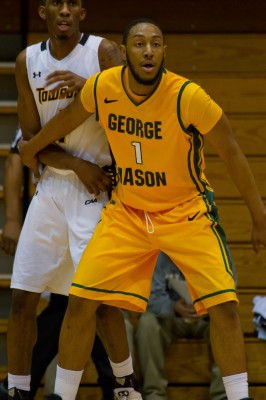Paris Bennett started the first exhibition for the Patriots to open their 2011-12 campaign. He also started the second, before an injury sidelined him for 10 games, the reason fans have not heard his name much since then.
Returners came back with a vengeance and underclassmen — even freshmen — had a chance to step up. A second injury in three years cost him more than any other player could.
“I think if he doesn’t get injured, he’s playing a lot more,” Coach Paul Hewitt said. “He had a bad ankle injury versus Marquette and subsequent to getting back on the court, he had a bad blister on the back of his foot. All those things contributed to a situation where certain guys got ahead of him.”
Starting guard Andre Cornelius missed 10 games at the beginning of the season, but came back and upended the starting lineup, moving in where Hewitt rotated underclassmen at the top of the key.
Forward Mike Morrison missed nearly all of his offseason games coming back from an injury of his own, but came back knowing his starting job would not be in jeopardy.
Both upperclassmen had something that Bennett could not claim. Not age, not their class, not even the number of minutes they played in years past, but the fact they had already established themselves as role players.
Cornelius returned as a point guard who liked to shoot – before he was moved to the shooting guard role – and Morrison returned as the team’s strong, physical hype man.
“[Cornelius] was one of three guys that had the most minutes that were played out of all of us,” Bennett said of last year’s point guard.
It was Bennett’s second experience missing a chunk of playing time. After breaking his wrist his first year, he was sidelined alongside teammate Vertrail Vaughns, making both of them redshirt sophomores this year. Vaughns came back keeping his unorthodox shot, draining treys from every part of the arc, eyeing the six-man spot after Isaiah Tate left. Consistency gave him a starting job.
“Coach feels like, in that situation, they could go in,” Bennett said. “He’s the coach, he’s got to make decisions. I can’t do anything about that.”
The backcourt has undeniable depth to stay around for a few more years and the frontcourt has all of the team’s experience as well as the youth to back it up.
“Right now, Bryon [Allen]’s playing pretty well,” Hewitt said. “Sherrod [Wright]has really put together some solid games. [Cornelius], the second half, has been stepping up, making big threes, shooting the ball well. Vertrail, defensively, on the ball, is really, really tough. Corey [Edwards is] a good basketball point guard.
“Paris can play. Ryan [Pearson]’s probably the Player of the Year in the league. Mike [Morrison] is a big-time 5-man. Erik Copes is a shot-blocking rebounder. It’s nothing about him. It’s more of a numbers crunch.”
For a first-year coach, the aim is to win games and to see how different players could have an impact on the game. In that regard, Bennett should have had the upper hand.
“Early in the season at practice, I was very impressed with his knowledge. There was a game, there were a couple of practices where Bryon was out with the flu or something like that and [Bennett] ran the point,” Hewitt said. “He’s a very smart player. He’s going to be a heck of a coach one day.”
2011 was not the first time Hewitt saw the guard. Before Rivals.com named Bennett as the top small forward recruit in the CAA, Hewitt saw him play at St. Patrick.
“The first time I saw him play, I think I was there for Kyrie Irving. He’s always been a good guy,” Hewitt said. “I remember seeing him playing a high school game, might’ve been his senior year in Trenton, he got popped in the mouth.”
Even after that game, where — if Hewitt’s memory recalls correctly — he missed the postseason with a concussion, Bennett pushed through in getting recruited by Mason.
This is only one more step on a bumpy road.
“I’m proud of how he’s handled everything. He’s been terrific,” Hewitt said. “I’m sure he’s frustrated. I understand it, but I’ve always told players you go back to your room, you scream and yell and shout because you’re frustrated. That’s fine, but when you’re part of a team, you have to stay ready and have a positive outlook.”
With motivation like that from his coach, Bennett is certainly not taking a back seat to his own recovery. There are seemingly no thoughts of transferring, just thoughts on working for another opportunity.
“All I’ve got to do is keep playing hard. I know if I work hard, I’ll keep getting better,” Bennett said. “I love it here.”







Comments